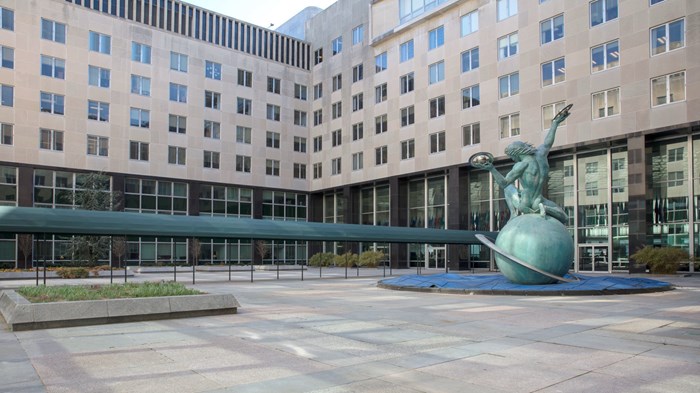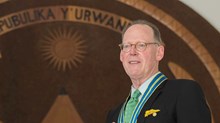Has China Committed Genocide? The U.S. State Department Says Yes.

Against the backdrop of the astounding athletic feats that took place at the 2022 Winter Olympic Games in Beijing lies a crisis that is upending respect for human rights and the rules-based international order. Former U.S. Ambassador for Global Criminal Justice Morse Tan spoke recently to Wheaton College on the genocide, crimes against humanity, and technototalitarianism occurring in China.
Tan, a leading expert on international criminal and human rights law and now the Dean of the Liberty University School of Law, headed the office at the State Department responsible for making the atrocity determinations that classified China’s treatment of the Uighurs and other Turkic minorities as a genocide and crimes against humanity in the last days of the Trump administration. These determinations have also been affirmed by Secretary of State Antony Blinken and the Biden administration. Atrocity determinations are not something to be taken lightly, explained Tan, and it also must be noted that these determinations are actually for the Chinese people, and not meant to be anti-Chinese.
While there is no hierarchy amidst atrocity determinations, the genocide determination is the headline-grabber and therefore the U.S. government tends to be particularly wary of invoking it, as it also triggers a legal obligation to intervene in the situation, said Tan. He also highlighted how this determination against the actions of the Chinese Communist Party government in China was “unprecedented in the sense that never before had an atrocity determination been made by the US government in regard to a government as powerful and as wealthy and as influential as the Chinese Communist Party.” In light of these determinations, many countries, including the U.S., United Kingdom, Canada, India, Australia, and others imposed a diplomatic boycott of the 2022 Beijing Olympics.
Tan outlined some of the horrendous crimes being perpetrated against the Uighur people that led his office to pursue the atrocity determination: 1-3 million Uighurs being put in detention centers, people being detained without due process, forced labor, murder, sexual crimes, forced abortions and sterilization, and re-education in the name of Han Chinese ethnonationalism.
The crimes Tan was working to combat were grave instances of injustice, and it was during these trying moments that his Christian faith and belief that seeking justice is an element of agape love emboldened him to act and not grow weary. He explained that when he became tired with the task ahead of him, he would “remember the people who have suffered from these mass atrocity crimes, and it would give [him] renewed motivation and strength.” Just as importantly was remembering that God that made each of these people in his image.
The work of justice rarely comes easily. He said that the work he was doing was reflective of the Biblical concept of mishpat, “which includes retributive justice, and that includes giving what is due in a particular instance and can be both positive and negative,” which is incredibly important for victims.
The justice seeking endeavor in China is not going to end anytime soon either. Tan outlined how China continues to use “technototalitarianism” or authoritarianism fueled by technological means, to curtail the freedoms of the Chinese people. This includes facial recognition and CCTV, being forced to download certain apps that monitor use of technology, and internet sniffers to track data. According to Tan, in this system of technototalitarianism, you are “guilty until proven innocent and you are guilty by association” and this system is being exported to other countries to “normalize and legitimize its use.”
The technototalitarianism is being joined with the government’s “distinct antipathy towards having a competing ultimate allegiance than to the Chinese Communist party in China.” This means that they are against Christianity and “will not brook any higher allegiance,” says Tan. Persecution has followed, with churches and mosques being destroyed, believers being imprisoned or executed, discriminated against, and not receiving social security. Sadly, this level of persecution was not always there, with Tan explaining that it is only in the past few years that China has been catapulted into the top 20 persecutors of Christians.
Amidst this persecution, however, there is hope for the church in China and the light it can shine in the darkness. The meteoric growth of Christianity in China has stunned scholars, Tan said, and it is projected to become the largest Christian country in the world in terms of number of believers if current trends continue.
Within this growth there do exist important needs, such as the irony that although China produces more Bibles than any other country, there are many Christians that still lack one. Additionally, Tan explained that it is the underground church that is the real church in China, and that church requires continued resources, support, and prayers. We also must be thankful, Tan said, of how “there are missionaries that go from China to other parts of the world and ways that Chinese Christians bless others in the body of Christ in various places all over the world, which is part of the beauty of the body of Christ.”
Brett Bauman is a senior at Wheaton College studying International Relations and Spanish. His research interests are in Latin American politics and US foreign policy, and he has worked as an intern at both the American Enterprise Institute and Freedom House.
The Better Samaritan is a part of CT's
Blog Forum. Support the work of CT.
Subscribe and get one year free.
The views of the blogger do not necessarily reflect those of Christianity Today.






















